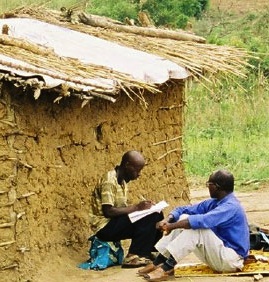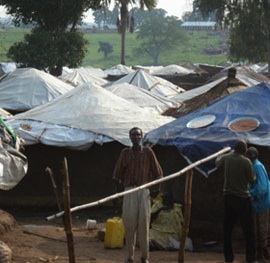Uganda has a long history of civil wars and has been surrounded by some of the worst conflicts in African history. As a consequence, Uganda hosts large refugee populations from many foreign countries and has to deal with the legacy of their own wars. vivo’s work in Uganda started in 1999 with the first trial of Narrative Exposure Therapy (NET) treating traumatized Sudanese refugees in Imvepi refugee camp situated in the very North of Uganda.
Treatments did not only reduce symptoms of posttraumatic stress disorder, but also filled the refugees with hope, new confidence and functionality [link to relatedpublication] . After the treatment, many were brave enough to leave the desperate camp situation and started to take care of their own livelihood.
In the early years of vivo in Uganda we continued to work with refugees which lead us to Nakivale camp in Southwestern Uganda, one of the largest refugee camps of the country, hosting refugees from many East African countries. From 2002 onwards vivo worked with Somali refugees and Rwandese genocide victims and succeeded in disseminating trauma therapy to members of the affected populations. vivo could proof for the first time that trauma treatment was highly effective when carried out by trained lay therapists [link to related publication] .
This was a breakthrough, since being a mental-health expert was not an indispensable prerequisite for trauma therapy any more. Few mental health experts can train numerous laymen and –women and thus reach many more members of the war-affected populations. During this project a fruitful cooperation started with Mbarara University that is lasting up to date. Besides building local capacity through the training of local therapists this was a next important step to ensure the sustainability of vivo’s work. In the following years of the Nakivale project, vivo pioneered Narrative Exposure Therapy in victims starting from the age of 12, also with success [link to related publication] .
Uganda has a long history of civil wars and has been surrounded by some of the worst conflicts in African history. As a consequence, Uganda hosts large refugee populations from many foreign countries and has to deal with the legacy of their own wars. vivo’s work in Uganda started in 1999 with the first trial of Narrative Exposure Therapy (NET) treating traumatized Sudanese refugees in Imvepi refugee camp situated in the very North of Uganda.
Treatments did not only reduce symptoms of posttraumatic stress disorder, but also filled the refugees with hope, new confidence and functionality [link to relatedpublication] . After the treatment, many were brave enough to leave the desperate camp situation and started to take care of their own livelihood.
In the early years of vivo in Uganda we continued to work with refugees which lead us to Nakivale camp in Southwestern Uganda, one of the largest refugee camps of the country, hosting refugees from many East African countries. From 2002 onwards vivo worked with Somali refugees and Rwandese genocide victims and succeeded in disseminating trauma therapy to members of the affected populations. vivo could proof for the first time that trauma treatment was highly effective when carried out by trained lay therapists [link to related publication] .
This was a breakthrough, since being a mental-health expert was not an indispensable prerequisite for trauma therapy any more. Few mental health experts can train numerous laymen and –women and thus reach many more members of the war-affected populations. During this project a fruitful cooperation started with Mbarara University that is lasting up to date. Besides building local capacity through the training of local therapists this was a next important step to ensure the sustainability of vivo’s work. In the following years of the Nakivale project, vivo pioneered Narrative Exposure Therapy in victims starting from the age of 12, also with success [link to related publication] .



